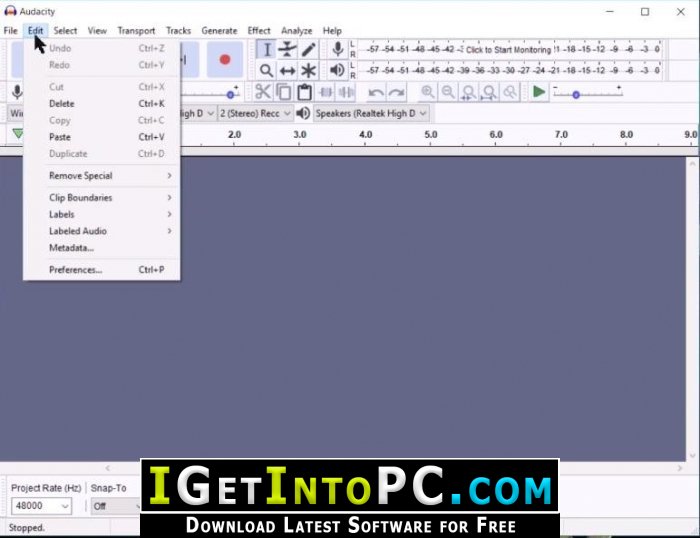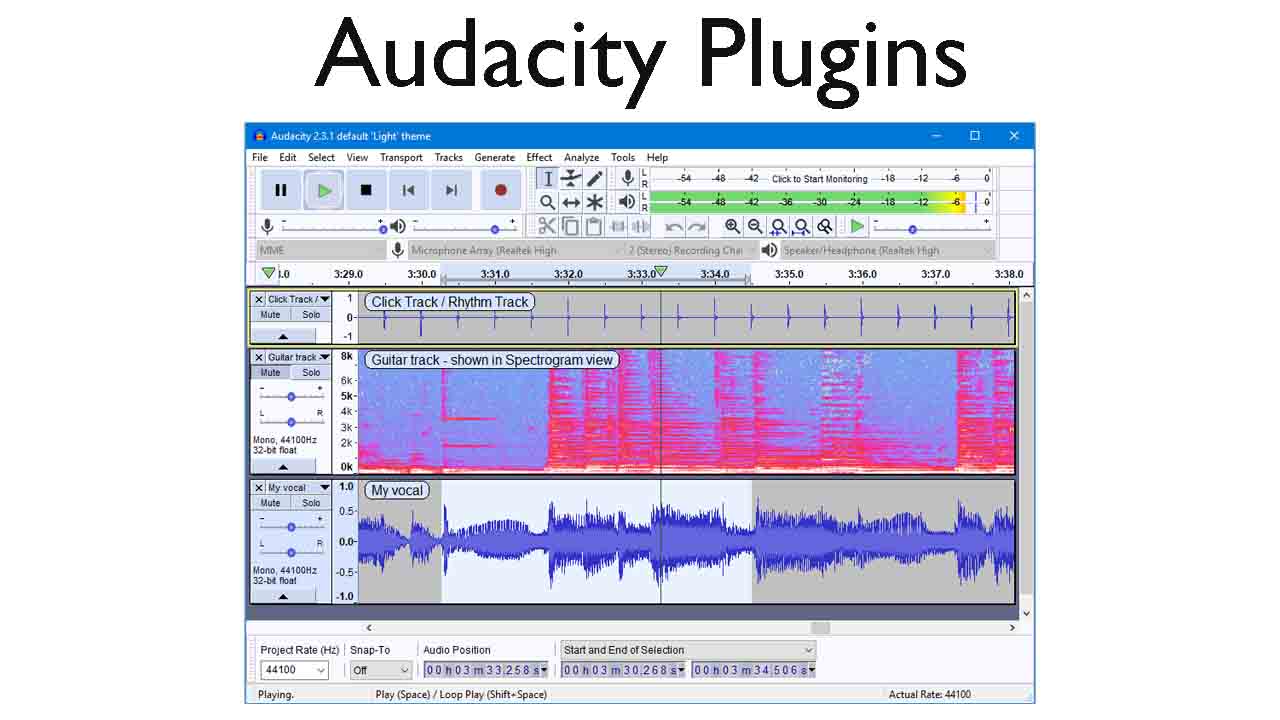
Download Ladspa Plugin Pack For Audacity
Overview
LADSPA is a standard that allows software audio processors and effects to be plugged into a wide range of audio synthesis and recording packages.
Support for LADSPA, LV2, Nyquist, VST and Audio Unit effect plug-ins. Effects written in the Nyquist programming language can be easily modified in a text editor – or you can even write your own plug-in. Experimental Modules that extend the functionality of Audacity. LV2 is an extensible open standard for audio plugins. LV2 has a simple core interface, which is accompanied by extensions that add more advanced functionality. Many types of plugins can be built with LV2, including audio effects, synthesizers, and control processors for modulation and automation. If you are a developer and want to jump straight into the code, you may want to look at the LADSPA header file or download the LADSPA SDK. For a well-written introduction to LADSPA, see Dave Phillips' article on Oriellynet. Plugin Libraries. Libraries contain a number of individual plugins.
Excellent support for JAWS, NVDA and other screen readers on Windows, and for VoiceOver on Mac in legacy Audacity Effects. Real-time preview of LADSPA, LV2, VST and Audio Unit (macOS) effects. Plug-in Manager handles plug-in installation and addition/removal of effects and generators from the menus. This software is sometimes limited in certain cases, but they can be overcome with the help of a lot of Audacity plugins that are available for download absolutely free. Several Audacity plugins, like LADSPA Plugin, LV2 Plugin, Nyquist Plugin, VST Plugin, Audio Unit Plugin, and Module Plugin are available to amplify the performance of Audacity.
For instance, it allows a developer to write a reverb program and bundle it into a LADSPA 'plugin library.' Ordinary users can then use this reverb within any LADSPA-friendly audio application. Most major audio applications on Linux support LADSPA.
If you are a developer and want to jump straight into the code, you may want to look at the LADSPA header file or download the LADSPA SDK.
For a well-written introduction to LADSPA, see Dave Phillips' article on Oriellynet.
Plugin Libraries
Libraries contain a number of individual plugins. A large number of plugin libraries have been written. Here are some of them:
- Probably the largest range of plugins is available from Steve Harris at http://plugin.org.uk/.
- Blop, by Mike Rawes, provides a set of oscillator plugins and more.
- The CAPS Audio Plugin Suite by Tim Goetze provides a number of plugins, including a range of guitar amp emulations.
- The Computer Music Toolkit (CMT) contains plugins by David Bartold, Richard Furse, Jezar and Nathaniel Virgo.
- Fons Adriaensen provides a wide range of plugins includings filters, phase vocoded compression/expansion, reverb and ambisonics.
- Dr. Matthias Nagorni has provided a set of EQ biquad filters.
- TAP Plugins are by Tom Szilagyi.
- Settel's Vocoder program has been ported to LADSPA by Josh Green.
- VLevel is a dynamic compressor with look-ahead by Tom Felker.
And here are some tools for generating plugins:

- csLADSPA allows plugins to be written with the Csound programming language.
- Faust is a compiled DSP language that can be used to produce LADSPA plugins.
- GDAM provides facilities to generate plugins automatically from graphs of simple plugins.
Hosts


There are many hosts out there. Here are a few:
- AlsaModularSynth is a modular synthesiser system.
- 'analyseplugin', 'applyplugin' and 'listplugins' are trivial LADSPA hosts included in the LADSPA SDK.
- Ardour is a multitrack Hard-Disk Recording system by Paul Davis and others.
- Audacity is an audio editor.
- Csound is a software synthesis package.
- Ecasound and Ecawave make up a graphical multitrack audio processing package by Kai Vehmanen.
- GDAM is an MP3 player and audio manipulator by David Benson and Geoff Matters.
- GLAME is a sound editing package.
- GNU Sound is a multitrack sound editor for Linux/x86.
- GStreamer is an open-source multimedia framework.
- MusE is a MIDI and audio sequencer by Werner Schweer.
- Mustajuuri is an audio signal processing application and toolkit.
- Pd is a graphical computer music system based for which LADSPA support is available.
- ReZound is a graphical audio file editor.
- Rosegarden is a MIDI and audio sequencer with notation support.
- Snd is a sound editor by Bill Schottstaedt.
- Spiral Synth Modular is a live music and sound production package.
- Sweep is a sound editor.
- TerminatorX is a real-time software synthesiser and sequencer for DJs.
- Wired is a MIDI and audio sequencer.
You may find links to other interesting things at http://linux-sound.org/ladspa.html.
History
The original LADSPA proposal was included in an email to the Linux Audio Developer Mailing List as part of an ongoing discussion on plugin API design.
The proposal was bounced around for a number of weeks before version 1 was finalised, on the 2nd April 2000. The focus was - and is - to provide an API that is a good compromise between functionality, intuition and compatibility but is simple. The 'S' in 'LADSPA' is meant seriously.
Because of this, there are conspicuous features missing (e.g. support for data types other than 32bit floating point numbers). Many of these have been excluded deliberately because including support would require excessive complexity for the host or plugin programmer or too specific an approach to overall architecture. The common ground between audio applications is not as large as one might imagine and LADSPA aims at this.
And all this seems to have worked out rather well. LADSPA is a very straightforward API to work with from both the host and plugin sides for most conventional plugins. It does not attempt to impose a way of doing things on the host, instead allowing the host to use plugins in almost any way it chooses. Plugin writers can start from example plugins or just the API and code up new plugins very quickly.
LADSPA has been released under LGPL (GNU Lesser General Public License). This is not intended to be the final license for LADSPA. In the long term it is hoped that LADSPA will have a public license that is even less restrictive, so that commercial applications can use it (in a protected way) without having to use a derived LGPL library. It may be that LGPL is already free enough for this, but we aren't sure. Does anyone want to pay for a lawyer? In the meantime, please mail me if this is an issue for you.
LADSPA has moved to version 1.1 with the introduction of default values and standardisation of 1.0f as 0dB.
There is nothing particularly Linux-specific about LADSPA's core design and it has been used on a number of different platforms. These are currently not supported on this website.
Resources
The API is captured within a header file. A simple Software Development Kit (SDK) is available which includes terse documentation, three simple hosts and ten example plugins.
Plugin types are identified by unique IDs. See the SDK for more details.
Dave Phillips provides an excellent overview.
Many Linux distributions manage LADSPA plugin libraries for you in a central location. However, if your plugins are not found by the host you are using, you may need to set the environment variable LADSPA_PATH manually. This should be a colon-separated list of directories to search to find plugin libraries. If this is set correctly, the 'listplugins' program in the SDK should list all your plugins.
If you want to start writing LADSPA plugins in C++ but do not wish to produce your own independent library, you might be interested in the framework used by the Computer Music Toolkit project.

Download Ladspa Plugin Pack For Audacity Windows 7
The latest updates to the LADSPA SDK and CMT library were made on the 6th January 2019.
The author (Richard Furse) can be emailed at richard at ladspa dot org.